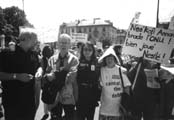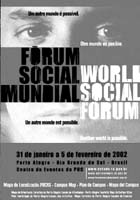SOURCE AND THE CRUX OF ANTI-GLOBALISM MOVEMENT
Irina Misliaeva,
Doctor of economic science, professor
of Moscow State University (MGU)
named after M. V. Lomonosov,
president of a public organization
"Democratic control (ATTAC - Russia)"
Globalization is an expansion all over the world. It is a qualitative new phase of development of world economy; the determinative fact of its development is world supremacy of international financial capital and transnational corporations.
 At present most women organizations from different countries are active participants of anti-globalism movement. Now the representatives of women organizations can be met not only in the columns of demonstrators protesting against worsening of social legislation, reduction of social guarantees, increase of unemployment and poverty. There is a lot of them among the participants of the most prominent world forums, which for the last several years were attended by the representatives of anti-globalism movement. Universal social forum in Portu Alegry (Brazil) was not an exception; it took place twice - in 2001 and 2002, and collected a record number of members. While in 2001 the First Universal social forum (anti-Davos) was attended by 10 thousand members from 122 countries, in 2002 only officially invited members amounted to 15 thousand people. On the whole, as much as 75 thousand people took part in the forum work, and women among them amounted to 43%. It is pleasant to mention that a woman, Elisaveta Bozhkova, an active participant of Russian Independent women movement, director of its Informational center, represented Russian organization "Democratic control - ATTAC-Russia" at this forum. At present most women organizations from different countries are active participants of anti-globalism movement. Now the representatives of women organizations can be met not only in the columns of demonstrators protesting against worsening of social legislation, reduction of social guarantees, increase of unemployment and poverty. There is a lot of them among the participants of the most prominent world forums, which for the last several years were attended by the representatives of anti-globalism movement. Universal social forum in Portu Alegry (Brazil) was not an exception; it took place twice - in 2001 and 2002, and collected a record number of members. While in 2001 the First Universal social forum (anti-Davos) was attended by 10 thousand members from 122 countries, in 2002 only officially invited members amounted to 15 thousand people. On the whole, as much as 75 thousand people took part in the forum work, and women among them amounted to 43%. It is pleasant to mention that a woman, Elisaveta Bozhkova, an active participant of Russian Independent women movement, director of its Informational center, represented Russian organization "Democratic control - ATTAC-Russia" at this forum.
What makes women organizations to be members of world anti-globalism movement and what is the essence of this movement? Unfortunately today, and most often, common citizens associate anti-globalism movement with a group of young people who, armed with sticks and clubs, travel from one country to the other, upset the work of important world forums, break shop-windows, turn over and set fire to cars. Anti-globalists are used to frighten common citizens, they are embodied and represented as a direct threat to peaceful and quiet life of city dwellers. Rather often mass media aggravate the situation on purpose, predicting an invasion of anti-globalists to those countries and cities where some world forum takes place. For example, this happened in Moscow at the end of October, 2001, where a travelling session of Davossky economic forum took place ("Izvestiya", October 24, 2001).
Of course, demonstrations and appearances of young people and people, who are not very young, take place, but this is just a visible, outer face of the movement, the main point of which is not always understood or (which is more often) deliberately is made vapid by those who benefit from presenting anti-globalists as a small group of extremists, dull-witted and uneducated people, who are obstacles in the way of social progress due to their speaking against such effective process as globalization. Today they are often compared with Luddites, who at the end of XVIII and the beginning of XIX centuries were against machinery application, broke the machine-tools so that the machinery wouldn't force people out of their working places. However, in spite of their opposition, public progress wasn't turned back and industrial revolution became a reality in England. Nowadays anti-globalists are treated the same way, they are considered to be fighting against windmills. And a conclusion that this movement has no future is made on this ground. Is it really so?
To answer this question we should turn to the sources of anti-globalism. Some people consider Sapatist army of national liberation (Mexico) which rose in opposition to a Treaty on free trade signed by USA, Canada and Mexico (NAFTA), which entered into force on January 1, 1994, predecessors of anti-globalism movement. In Mexican state Chiapas, in summer 1996, a first international meeting of organizations speaking against realization of the Treaty on free trade and joining other countries of Latin America to the Treaty, took place. However, in our point of view, it was only a beginning. The main events spread out in Europe - in France - at the end of 90th.
In December 1997, French newspaper "Le Mond diplomatique" published an article "To disarm the market" by Ignacio Ramona, which had an effect of an exploded bomb. First of all, the matter concerned a rash growth of financial markets (currency-, credit-, stock markets) during globalization, which gained independent and self-sufficing importance, turning away from production and trade.
It caused an abrupt increase of number and volume of financial speculations. As the processes of globalization intensified, financial capital was given lots of new opportunities for self-expansion omitting production sphere. Availability of off-shore zones - so-called "tax oases" where capitals were surely protected from the outside and could be put into circulation over and over again, was also the reason. This fact as well as involving the money of social funds (pension funds, funds of social insurance, etc.) into financial speculations also made its contribution. And, finally, wide spreading of new financial instruments and operations which gave an excellent opportunity for unlimited financial manipulations.
Financial crisis, which started in the countries of South-Eastern Asia in autumn of 1997, was quite natural result of these processes. This crisis became the main lesson of the 90th, the lesson for everybody - both developed and developing countries. But at the same time it became an impulse which agitated the whole world. Suddenly it became clear that financial globalization went so far and such financial resources are at the disposal of big international funds, that they are enough to demolish economics of any country, even the most developed one.
This danger on the part of international financial capital and also on the part of growing power of international financial organizations, with due regard of a crisis of trade union and international labour movements, became the main reason which consolidated a number of progressive French editions, public associations and trade unions into organization "Attac-France"; unification took place in France, in June 1998.
 At first, this organization proclaimed that its main goal was to unite all the efforts of democratic powers in order to impose a so-called "Tobin tax".* That is why the name of the association: "Action pour une taxe Tobin d'aide aux citoyens" (ATTAC), which in English means - "For Tobin tax to help citizens". At first, this organization proclaimed that its main goal was to unite all the efforts of democratic powers in order to impose a so-called "Tobin tax".* That is why the name of the association: "Action pour une taxe Tobin d'aide aux citoyens" (ATTAC), which in English means - "For Tobin tax to help citizens".
According to organizations, members of "ATTAC" association, realization of Tobin's proposal would allow to reduce considerably the amount of financial speculations, to release funds for development of real economic sector and for solving social problems. Besides, in the opinion of "ATTAC" founders, struggle for imposing Tobin tax could unite different social organizations and even different political parties. And it happened as anticipated. Simple slogan, clear to most people, united them. Number of organization supporters and allies began to grow. Among them there were teachers, workers, scientists, politicians, students, unemployed people and even businessmen. By the end of 1999 the whole number of supporters of this movement only in France amounted to 1000 people, and by the end of 2001 - 30 thousand men.
 Soon after "ATTAC-France" establishment it became evident that Tobin tax was quite tangible real goal, but it inevitably concerns a wide range of problems such as: control of international financial organizations activity, the problem of the third countries debts, protection of citizens rights and liberties, including rights to worthy life, free education and health service, right to live for 8 billion people, not only for "golden billion", and other problems. This rather wide view, based on the necessity of struggle against negative consequences of globalization, became a foundation of "ATTAC" platform which was accepted at the international meeting in Paris in December 1998. Soon after "ATTAC-France" establishment it became evident that Tobin tax was quite tangible real goal, but it inevitably concerns a wide range of problems such as: control of international financial organizations activity, the problem of the third countries debts, protection of citizens rights and liberties, including rights to worthy life, free education and health service, right to live for 8 billion people, not only for "golden billion", and other problems. This rather wide view, based on the necessity of struggle against negative consequences of globalization, became a foundation of "ATTAC" platform which was accepted at the international meeting in Paris in December 1998.
Delegations from organizations of other countries, the aims of their activity similar to the aims of "ATTAC-France", were also invited to take part in this meeting. It turned out that there is quite a number of such organizations in the world. They are Movement of landless peasants (Brazil), Political and informational center of international solidarity (South Korea), Women movement (Canada, Quebec), Association of state farmers Karnathaka (India), World forum of alternatives - FMA (Belgium, Canada, Senegal), and others. Most of these organizations took part in international meeting in Paris on December 11-12, 1998 and expressed their readiness to participate or assist the "ATTAC" movement as the movement for democratic control of financial markets and their establishments.
From the very beginning organizations, which struggled against something, began to gather round "ATTAC-France": these were ecological organizations struggling against environmental pollution, women organizations struggling against increasing women discrimination, trade unions struggling against impairing working people rights and so on. Each of public organizations drew attention to a certain problem, which either was created by globalization or became more acute under globalization processes. In my opinion, that was the real reason, why the organizations, consolidating around "ATTAC-France", were associated with a word "against", which finally was transformed in a general name "anti-globalism".
Most of the organizers consider this name inappropriate since it distorts the true meaning of the movement. Some people, especially outsiders, may think that all its members protest against globalization. However, it is not so. Members of anti-globalism movement struggle not against globalization but against its negative consequences, against neo-liberal model of globalization, which is realized only in the interests of transnational companies and international financial capital, against globalization, which ignores interests of most people.
Unfortunately, the word "anti-globalism" doesn't contain this explanation. A certain denial is stressed in the name, positive aims are not seen, which is not right as it confuses most people.
The second, though in fact the first, big international meeting took place in Paris on June 24-26, 1999, which was visited altogether by about a thousand people from 70 countries of the world. It was called "Market dictatorship? Another world is possible". The participants of this meeting worked out a plan of specific activities for the near future. The resolution, accepted at the conference in Paris, stressed a necessity to increase pressure upon national governments so that they would refuse to take part in the second round of discussions on the project " Agreements of Multilateral Investment" (AMI) which was to take place at the end of 1999 in the World Trade Organization (WTO). In the opinion of the conference participants, all the projects which are now discussed by WTO lay stress on subordinating political power to transnational capital which leads to ineffective, irregular and unfair distribution of world resources, to misappropriation of the major part of the world resources by a small group of people and to destroying of the Planet ecosystem. That is why informational leaflets about negative consequences of such negotiations were decided to be prepared and spread in all the countries of the world. In case this discussion were not postponed or stopped, mass actions were supposed to be held in all the countries starting from November 1999.
Besides, conference in Paris proposed to start active struggle for imposing a financial operations tax and abolishment of off-shore zones. In the opinion of the conference participants, such a campaign could be carried out initially in Europe, then in other countries. A negative role of international financial institutes was also mentioned in the resolution; their activity caused worsening of economic situation in Asia, Russia and Brazil. International financial system and its institutes had to be radically changed. Their activity should be subordinated to political democracy. We should also struggle for remitting of third world countries debts , which is especially acute in view of landslide of prices on raw materials, caused by crises in Asia and Latin America. All the above mentioned demands, as it was mentioned at the conference, are inseparable from guarantees of civil, political rights, right to unionize and to unite in associations. They are also inseparable from concrete definition of rights to equality of men and women.
The conference revealed that so called "universality" was nothing but dictatorship of the market, free from any restrictions, while earlier it was made famous as an alliance of "market and democracy" and as a single possible choice for humanity. Privatization of mass media and its control by the richest and most powerful people makes such understanding of "universality" prevailing. In reality, neo-liberal policy means degradation of employment system, public welfare, education, health service and system of distribution of the resources which we gained from the previous generations (it concerns land, water and energy resources, cultural heritage). Using of human genome (cloning), put into practice by private persons for commercial reasons, especially visually demonstrates how far this rapaciousness goes. That is why, as was mentioned at the conference, modern globalization is destroying for basic right to life and for the life itself. It causes crises and destruction and pushes the world to catastrophe. That is why it is essential to stop it. Therefore, the conference called upon all progressive world forces to unite their efforts within International people's movement for democratic control of financial markets and their institutions.
Only two and a half years past since the meeting in Paris. But during this time the number of ATTAC-France's followers considerably increased. Similar organizations with similar names, for example, ATTAC-Brazil, ATTAC-Argentina, ATTAC-Germany and so on, were established in different countries. In Russia, in August 2000, a number of trade unions, some women organizations and progressive scientists established an organization "Democratic control (ATTAC-Russia)". As a whole, at present such organizations exist in more than thirty countries.
Nowadays, there is also a "parliamentary network" of the "ATTAC" movement, which consists of the parliamentarians from different countries, who share the aims of the movement and try to coordinate their actions.
 International movement ATTAC is organized as a network, without any hierarchic structures and geographic "center". Communication between its members is realized through Internet where they exchange information about their activity, actions, which they took or were going to take, and other information. International movement ATTAC is organized as a network, without any hierarchic structures and geographic "center". Communication between its members is realized through Internet where they exchange information about their activity, actions, which they took or were going to take, and other information.
In France ATTAC is established as a network of local committees. Committees, which are the parts of general network, are established in cities and residential areas. They organize the activity on their own, according to the general platform of ATTAC. People take an active part in all the movement activities: in public campaigns (for imposing of Tobin tax, for reforming WTO, for abolishment of off-shore zones, etc.); in studying globalization issues; in anti-globalism demonstrations, in scientific public conferences. In France National body on coordination works out a plan of actions and top priority tasks for the near future, while local committees choose which of them they would follow. The organization activity is financed at the expense of membership fees.
Nowadays social foundation of the anti-globalism movement is very vast. These are trade union, women and ecological organizations. There are lots of youth organizations which take active part in demonstrations and protest actions. These are, for example, "Movimiento de Resistencia Global" ("Movement of Global Resistance" - Spain) - an informal union of different youth organizations, including movement of "settlers" (who occupy empty flats by force), and movement, which organized petitions for remitting of developing countries debts (1.1 million signatures); "Tute Bianche" (White overalls - Italy) - an organization of homeless and unemployed people; "Globalize resistance" and "Drop the Dept", acting in England; student movement in USA, which organized "Direct Action Network", directly connected with the events in Seattle, and others. There is its own youth network inside ATTAC.
Youth organizations differ from other organizations by their informality and radical actions. Some of them (especially anarchists) really believe that actions of nonviolent insubordination, which are used by most anti-globalism movements as a demonstration of their disagreement, are unlikely to have any effect now. More radical actions are essential. These organizations form so-called "Black Block" and these organizations break shop-windows, turn over the cars. They consider that in such a radical way they can draw attention to themselves. But there are as few as 3-5 thousand of them. Most of "ATTAC" members condemn their tactics and try to isolate themselves from them, understanding that activity of these young people discredit the whole movement.
Nowadays two fundamentally different approaches towards strategic goals of the movement have become rather visible within the movement. The followers of the first approach (mainly, social democratic organizations) consider that modern capitalism can be reformed from within by, for example, imposing Tobin tax, changing the principles of financial organizations IMF, WTO and so on. The others think that reforming of the capital will give nothing. That is why Tobin tax or reforming of IMF will change nothing. So it is necessary not only to speak about negative consequences of globalization but to propose something new, in alternative to the existing model of neo-liberal globalization.
This attempt, in which they tried to show that another world was possible, was made by anti-globalists at the First World Social Forum in Portu Alegry in Brazil in January 2001. This action was intended both as an action parallel to the forum in Davos and as a measure contrary to it in many respects.
 First of all, it is a geographic contrast. World Economic Forum was annually held at the famous winter resort in Switzerland. World Social Forum took place in Brazil where it was a hot summer. But geographic remoteness was not more than a visible difference. The main point was different: Davos was attended by ministers, top level officials and prominent businessmen, while in Portu Alegry there were delegates of numerous social organizations and movements, as well as representatives of trade unions from different countries. In Davos great attention was paid to create favorable economic conditions for free capital flow during globalization, while in Portu Alegry possible negative consequences of this process were discussed. The members of World Social Forum try first of all to focus attention on those social consequences which were inevitable during globalization and which were paid little attention by those who were anxious to create an integrated economic area. And finally, World Economic Forum took place in one of the richest and respectable cities of Europe, while Portu Alegry had other reputation - an experiment on establishing a system of city-dwellers self-government has taken place there for already 8 years. And this experiment has already produced positive effect. First of all, it is a geographic contrast. World Economic Forum was annually held at the famous winter resort in Switzerland. World Social Forum took place in Brazil where it was a hot summer. But geographic remoteness was not more than a visible difference. The main point was different: Davos was attended by ministers, top level officials and prominent businessmen, while in Portu Alegry there were delegates of numerous social organizations and movements, as well as representatives of trade unions from different countries. In Davos great attention was paid to create favorable economic conditions for free capital flow during globalization, while in Portu Alegry possible negative consequences of this process were discussed. The members of World Social Forum try first of all to focus attention on those social consequences which were inevitable during globalization and which were paid little attention by those who were anxious to create an integrated economic area. And finally, World Economic Forum took place in one of the richest and respectable cities of Europe, while Portu Alegry had other reputation - an experiment on establishing a system of city-dwellers self-government has taken place there for already 8 years. And this experiment has already produced positive effect.
World Social Forum took place in the premises of the Catholic university, where for five days the delegates were discussing wide range of questions, among which there were questions of public debt, reforming of modern big financial institutions, forms and methods of control over using budget funds, investment movement and using national wealth. Negative consequences of privatization of social sector and mass media, violation of citizens rights during privatization of resources, education system and health service were also discussed.
Women problem was considered as a special, separate problem. Women organizations, which now are included in anti-globalism movement, think that the consequences of neo-liberal globalization model, which is now strenuously imposed by transnational corporations, international financial institutions and some developed countries, particularly by the USA, first of all have already negatively influenced women. The rate of unemployment, especially among women, grows because of globalization. As a result, women are more and more involved in half-legal and unauthorized spheres of activity, where women are completely unprotected. Privatization of social sector - education, health service and culture - first of all makes them inaccessible for women, and as competition at the labour market becomes more tough, women discrimination intensifies in all its forms. Unemployment and poverty inevitably cause another negative consequence - increase of violence against women, first of all, family violence. That is why today women organizations actively protest against such globalization, which instead of solving women problems only aggravate them.
Today one of the main slogans of anti-globalism movement are catchwords: "Give people opportunity to chose themselves how to live ". People shouldn't be imposed an idea of what is good proceeding only from the interests of Davos Forum members. People themselves will understand and define what is good for them, and what is bad. What fits them and what doesn't. They shouldn't be prevented in doing so. Anti-globalism movement is trying to achieve it by strengthening, and not by destroying democratic principles of modern society.
*James Tobin - American economist, the Nobel Prize laureate in economics; as early as in 1972 calculated that if all the financial operations were taxed, annual tax amounting to 0.1% would bring 166 billion dollars in return. J.Tobin proposed to donate this sum to international organizations, alternative to existing big international financial organizations (IMF, World Bank and so on), for struggle against inequality and poverty, for development of education, for improving economics in backward countries.
|